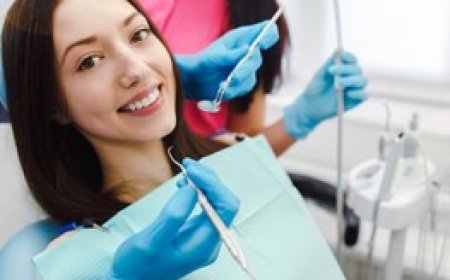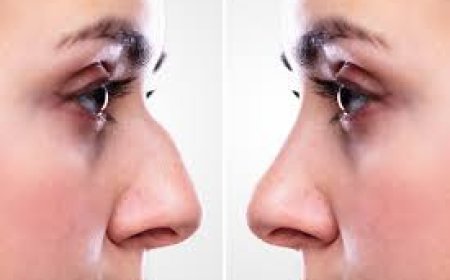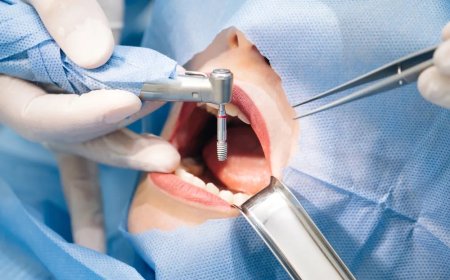Oral Health Risks in Women: What You Need to Know
Explore the key dental challenges women face from hormones to stress and how regular care from experts in Cosham can help maintain long-term oral health

Oral health is a vital aspect of overall well-being, yet it is often underestimated, especially when discussing how it affects women differently. From hormonal fluctuations to lifestyle habits and medication use, women face distinct oral health challenges throughout various stages of life. By understanding these unique risk factors, women can take proactive steps toward maintaining optimal dental health and preventing long-term issues.
This blog explores the key oral health risks that specifically impact women and how they can be managed effectively with informed care and guidance.
Hormonal Fluctuations and Oral Health
Womens hormones play a significant role in oral health. Oestrogen and progesterone influence blood supply to the gums and affect the bodys inflammatory response, making gums more sensitive to plaque and bacteria. These changes occur during several key life stages:
-
Puberty: Increased hormone levels can lead to swollen, red, and bleeding gums.
-
Menstruation Gingivitis: Certain women may develop gum inflammation and bleeding during their menstrual cycle, a condition known as menstruation-related gingivitis.
-
Pregnancy: Hormonal surges heighten the risk of gum disease and dental sensitivity.
-
Menopause: Reduced oestrogen levels can lead to dry mouth, burning sensations, and receding gums.
These shifts can increase the risk of gingivitis and, if left untreated, progress to periodontitis. Regular appointments with a hygienist in Cosham are crucial during these periods, as they can provide deep cleaning and gum care tailored to hormone-related changes.
Pregnancy and Oral Health Risks
Pregnancy presents several oral health challenges. A frequently occurring condition during pregnancy, this form of gingivitis is triggered by hormonal shifts that result in swollen, inflamed, and bleeding gums. If left untreated, it can progress to periodontitis, which may affect both mother and baby.
Key concerns include:
-
Morning sickness: Stomach acid weakens enamel, increasing the risk of decay.
-
Brushing advice: Avoid brushing immediately after vomiting. Rinse with water or fluoride mouthwash and brush after 30 minutes.
-
Dental safety: Dental treatments are safe during pregnancy.
A dentist in Cosham can recommend suitable care and plan routine check-ups especially during the second trimester, which is generally considered the safest time for dental procedures. Early attention can protect both oral and overall health.
Osteoporosis and Bone Health
Women, particularly post -menopausal, are at higher risk of osteoporosis, which not only affects bones in the body but also the jawbone. This can lead to loose teeth, tooth loss, and increased vulnerability to periodontal disease.
There is a strong link between osteoporosis and oral health:
-
Jawbone Deterioration: The weakening or loss of jawbone structure can compromise the support for both natural teeth and dental implants.
-
Tooth mobility can develop due to reduced bone density.
-
Bite changes may occur, affecting chewing and speech.
Hormone replacement therapy (HRT) can help slow bone loss, but it is also important to maintain regular dental evaluations. A dentist in Cosham can monitor bone changes using X-rays and recommend preventative measures to preserve oral health.
Lifestyle Choices That Affect Womens Oral Health
Certain lifestyle factors can increase oral health risks in women more significantly than in men. These include:
Common lifestyle-related oral health risks:
-
Smoking: Women who smoke are more prone to gum disease and delayed healing post-treatment.
-
High-sugar diets: These increase the risk of cavities and plaque build-up.
-
Eating disorders (bulimia, anorexia): Frequent vomiting leads to enamel erosion and dry mouth.
-
Hydration issues: Inadequate water intake can worsen dry mouth, especially in menopausal women.
Maintaining a balanced diet, avoiding tobacco, and staying hydrated can all contribute to stronger, healthier teeth and gums. Preventive cleanings with a hygienist in Cosham also help combat plaque and tartar caused by diet and lifestyle.
Medications and Side Effects
Several medications commonly prescribed to women can have unintended effects on oral health. These include:
-
Oral contraceptives
-
Hormone replacement therapy (HRT)
-
Antidepressants and anti-anxiety medications
Possible oral side effects include:
-
Dry mouth (xerostomia): Increases risk of cavities and gum disease
-
Gum overgrowth or inflammation
-
Altered taste sensations
If youre on long-term medication, it's essential to inform your dental provider. They can suggest tailored oral care routines, such as increased fluoride use or saliva substitutes, to offset these effects.
Oral Health Across Age Groups in Women
Different life stages bring different oral health challenges. Below is a simple breakdown to help identify what to watch for during each stage:
|
Age Group |
Oral Health Considerations |
|
Teens |
Hormonal changes, braces, habit formation, poor flossing routines |
|
Reproductive Years |
Pregnancy-related gum issues, birth control side effects, stress habits |
|
Middle Age |
Early bone loss, increased sensitivity, oral medication side effects |
|
Older Women |
Mouth dryness, missing teeth, managing dentures, and an increased likelihood of developing gum disease |
Proactive care tailored to these stages ensures that problems are addressed early and managed appropriately.
Stress and Its Impact on Womens Oral Health (100 words)
Chronic stress can take a significant toll on womens oral health, especially during busy or transitional life phases.
How stress affects your mouth:
-
Bruxism (teeth grinding): Often stress-induced, it can wear down enamel and cause jaw pain.
-
Canker sores: More common during emotional strain.
-
Poor oral care: Stress may cause you to miss brushing sessions or postpone dental appointments.
Elevated cortisol levels may compromise gum health and weaken the immune system, making it more difficult to combat oral infections. Women experiencing high stress levels should consider using a nightguard, maintain regular appointments with a dentist in Cosham, and discuss stress management with healthcare providers.
Video Link - Emergency Dental Care in Cosham Help When You Need It Most! ?
Preventive Measures and Dental Care Tips
Preventing oral health problems begins with a personalised and consistent approach to daily care, supplemented by professional treatment.
Dental care tips for women:
-
Brush twice daily with fluoride toothpaste
-
Use fluoride mouthwash to strengthen enamel
-
Avoid sugary snacks and drinks between meals
-
Wear a mouthguard during sports or if grinding teeth at night
Incorporating these habits into your lifestyle reduces the risk of decay, gum disease, and tooth loss. Regular appointments with a hygienist in Cosham ensure deeper cleaning and early detection of issues that may not be visible at home.
Conclusion
Women face a unique set of oral health challenges throughout their lives, influenced by hormones, lifestyle, medications, and age-related factors. Staying informed, practicing good oral hygiene, and seeking regular professional care can make a significant difference in long-term dental wellness.
For women in Cosham, access to expert dental care is always close by. Whether youre managing hormonal changes, pregnancy-related concerns, or post-menopausal conditions, the trusted team at Cosham is here to support your journey to better oral health with personalised, compassionate care.











































